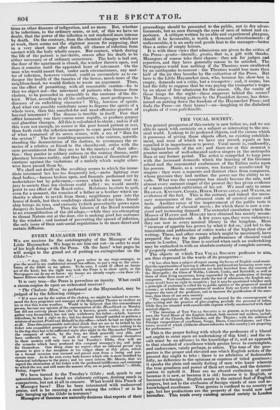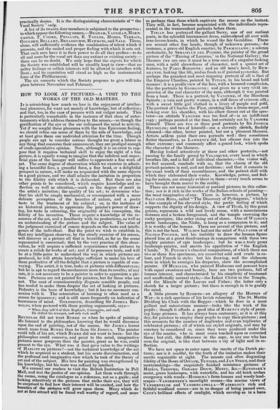THE VOCAL SOCIETY.
THE printed prospectus of this society is now before us, and we are able to speak with certainty on a subject so interesting to the mu- sical world. Looking to its professed objects, and the means which it possesses of giving those objects effect, no existing establish- ment, and none of which we have any record, equals or has equalled it in importance or in power. Vocal music is, confessedly, the highest branch of the art ; and there are at this moment a greater number of well-educated native singers in the Metropolis than at any former period. The artist is compelled to keep pace with the increased demands which the learning of the German school and the ornamental exuberance of the Italian make upon his powers. Music, as a science, was formerly uncultivated by singers : they were a separate and distinct class from composers, whose province they had neither the power nor the ability to in- vade. What was the exception has nearly become the rule, and almost every eminent singer of the present day has given evidence of a more extended cultivation of his art. We need only to name BRAHAII, KNYVETT, COOKE, HORN, HORNCASTLE, and WELSH, as evidences of the fact. This is the natural, and indeed the neces- sary consequence of the advanced state of musical science and taste. Another cause of the improvement of the public taste is the publication of classical music; for which there is DOW a con- stant and increasing demand. • The extended circulation which the Masses of HAvrorr and MOZART have obtained has mainly accom- plished this desirable end. A few years ago, they were unknown; they are now in every musical library in the kingdom. Here "increase of appetite has grown by what it fed on," and led to the translation and publication of entire works of the highest class of writing. These, and other causes which might be mentioned, have prepared the way for the public performance of classical vocal music in London. The time is arrived when such an undertaking may be embarked in with an absolute certainty of complete success, if properly conducted. The objects at which THE VOCAL SOCIETY professes to aim, are thus expressed in the words of its prospectus— "It has often been a subject of regret among the lovers of English vocal music that the opportunities of hearing it effectively performed are becoming more rare- The compositions of native musicians are nearly banished from the concerts of the Metropolis ; the Glees of Welke, Callcott, Cooke, and Battishill, as well as those of their living successors, being superseded by the productions of foreign composers. Were excellence alone made the test of admission, the English mu- sician would have no right to complain ; but it may be questioned whether such a principle of exclusion is called for by public opinion or the progress of musical science ; or whether the compositions of modern Italy are better calculated to improve the taste of the professor, and to increase the gratification of the ama- teur, than those of our own country.
"The regulations of the several societies formed for the encouragement of glee-writing and the practice of glee-singing, preclude the presence of ladies, while they are attended with considerable expense wholly unconnected with their musical objects.
"The intention of TIIE VOCAL SOCIETY is to present, as its principal fea- ture, the Vocal Music of the English School, both ancient and modern, includ- ing that of the Church, the Chamber, and the Theatre ; with the addition of Foreign compositions of excellence, Songs, Duets, Concerted pieces, and Cho- ruses, several of which (hitherto almost unknown in this country) are preparing for performance."
This is the proper feeling with which the professors of a liberal art ought to enter upon an undertaking of this kind ; and the re- sult must be an advance in the knowledge of it, and an approach to that standard of excellence which genius loves to contemplate, and endeavours, vainly perhaps, to attain. The tone of the pros- pectus is the proper and elevated one which English artists of the present day ought to take : there is no adulation of fashionable folly, no deference to the opinions or caprices of titled greatness; it speaks the plain and manly feeling of men who know wherein the true greatness and power of their art resides, and the determi- nation to uphold it. Here are no absurd exclusions of music because it is new, or because it is old; because it is English, or because it is foreign. English musin is the natural food of English singers, but not to the exclusion of foreign viands of rare and ac- knowledged excellence. True genius is confined to no country or age, but her productions are the property of the world now and hereafter. This truth every existing musical society in London practically denies. It is the distinguishing characteristic of" the Vocal Society " on/y. A list of its twenty-four members is subjoined to the prospectus ; in which appear the following names,—BRAH AM, VAUGH AN, HORN- CASTLE, T. COOKE, PHILLIPS, E. TAYLOR, HOBBS, TERRAIL, GOULDEN, BELLAMY, BaoADHURST, HAWKINS, and SALE. These, alone, will sufficiently evidence the combination of talent which it presents, and the united and proper feeling with which it sets out. That such men have it in their power to do all they profess—to do all and snore for the vocal art than any extinct or existing society-- there can be no doubt. We only hope that the objects for which the Society was established will be steadily kept in view—that no , paltry feelings or selfish interests will be allowed to interfere with them ; and its reputation will stand as high as the instrumental fame of the Philharmonic.
The six concerts which the Society proposes to give will take place between November and February.



























 Previous page
Previous page